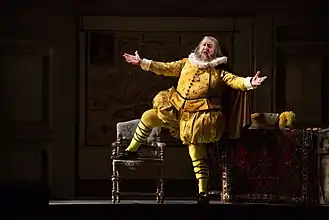Ambrogio Maestri
Ambrogio Maestri (born 1970) is an Italian operatic baritone. He is especially known for his portrayal of the title character in Giuseppe Verdi's Falstaff.[1][2] He studied piano and singing in his home town, Pavia. In Italy he has performed at the Teatro alla Scala in Milan, Teatro di San Carlo in Naples, Teatro Regio in Parma, Teatro dell'Opera di Roma, Teatro Regio in Turin, Teatro Verdi in Trieste and the Arena di Verona. Abroad he has performed at the Deutsche Oper Berlin, Teatro Nacional de São Carlos in Lisbon, the Royal Opera House in London, the Teatro Real in Madrid, the Metropolitan Opera in New York City, San Francisco Opera House, the Konzerthaus and the Staatsoper in Vienna, the Gran Teatre del Liceu in Barcelona and others.

He presents as a powerful, robust man on stage. Gramophone has described him as Italy's answer to Bryn Terfel,[3] "fresh-voiced [and] emotionally sympathetic."[4]
He has been critically praised by the likes of Riccardo Muti.[5] Edward Seckerson of The Independent said of his performance as Falstaff at the Royal Opera House of London that he is "wonderfully real, animating all aspects of the text and making great play of the innate contradiction between a booming, boorish, authority and those mellifluous remnants of wily old airs and graces."[6]
One of his earliest roles was Monterone in Rigoletto, in 1999; he was cast by then-director Placido Domingo at the Washington National Opera.[7] In 2003 he played Rolando in La battaglia di Legnano at the Teatro di San Carlo.[8] In 2012 he played the role of Dr Dulcamara in Gaetano Donizetti's L'elisir d'amore in Vienna, and at the Metropolitan Opera in September and October alongside Anna Netrebko.[9] In December 2013 he gave his 200th performance of Falstaff in a new production by the Metropolitan Opera in New York.[10]
He appears in complete opera streaming videos of Falstaff, L'elisir d'amore, and Adriana Lecouvreur at Met Opera on Demand.[11]
Besides his involvement in opera, he is known for his published recipes for Italian food (particularly risottos), and for his cooking videos (some of which are posted to YouTube.)[7]
Repertory
- Giacomo Puccini: Tosca (Scarpia), Gianni Schicchi
- Alfredo Catalani: La Wally
- Gaetano Donizetti: L'elisir d'amore, Lucia di Lammermoor, Don Pasquale (title role)
- Ruggero Leoncavallo: Pagliacci
- Pietro Mascagni: Cavalleria rusticana
- Giuseppe Verdi: Falstaff, Aida, Il trovatore, La battaglia di Legnano, La forza del destino, La traviata, Nabucco, Otello, Rigoletto, Simon Boccanegra, Un ballo in maschera
References
- "Concert review". Classical Source. Retrieved 15 October 2012.
- Mackenzie, Sir Compton; Stone, Christopher (2004). The Gramophone. C. Mackenzie. p. 127.
- Gramophone Classical Good CD & DVD Guide. Gramophone Publications. 2005. p. 1330.
- Mackenzie, Sir Compton; Stone, Christopher (2005). The Gramophone. C. Mackenzie. p. 84.
- Muti, Riccardo (2011). Riccardo Muti. Rizzoli. p. 136. ISBN 978-0-8478-3745-8.
- "Ambrogio Maestri is Verdi's Falstaff". ABC Classic FM. 24 June 2012. Archived from the original on 20 February 2016. Retrieved 1 October 2012.
- https://www.nytimes.com/2013/12/05/arts/music/a-plus-size-falstaff-grows-into-his-outsize-part.html
- RM, rassegna musicale italiana. Rassegna musicale italiana. 2003. p. 25.
- "Exclusive interview with Ambrogio Maestri". Opera Focus. Archived from the original on 6 December 2012. Retrieved 1 October 2012.
- Tommasini, Anthony. "An Outsize Rapscallion Let Loose on Postwar England". The New York Times. Retrieved 20 June 2015.
- Met Opera on Demand.
External links
- Official website
- Interview at Operafocus.com